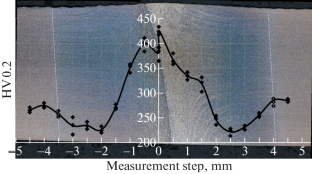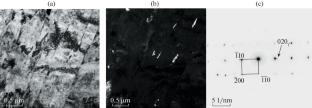旋转摩擦焊接接头中碳钢相变的晶体学特征
IF 0.5
4区 物理与天体物理
Q4 MECHANICS
引用次数: 0
摘要
摘要 采用取向(EBSD)和透射电子显微镜方法研究了中碳钢在旋转摩擦焊接过程中α'相和γ相的结构和取向关系。结果表明,由于相再结晶,在焊缝结构中形成了带有γ相夹层的马氏体。根据相间边界角度偏差谱的类型,确定了二次(还原)奥氏体的形成。结果表明,在这种情况下,α相和γ相晶体之间的取向关系接近贝恩取向关系。本文章由计算机程序翻译,如有差异,请以英文原文为准。


Crystallographic Characteristics of Phase Transformations in the Field of Medium-Carbon Steels of a Joint Obtained by Rotational Friction Welding
The structure and orientational relationships of the α' and γ-phases in medium-carbon steels during rotational friction welding were studied using orientation (EBSD) and transmission electron microscopy methods. It is shown that, as a result of phase recrystallization, martensite with interlayers of the γ-phase is formed in the structure of the weld. Based on the type of spectrum of angular deviations of interphase boundaries, the formation of secondary (reverted) austenite was established. It is shown that in this case an orientation relationship close to Bain’s is realized between the α- and γ-phase crystals.
求助全文
通过发布文献求助,成功后即可免费获取论文全文。
去求助
来源期刊

Doklady Physics
物理-力学
CiteScore
1.40
自引率
12.50%
发文量
12
审稿时长
4-8 weeks
期刊介绍:
Doklady Physics is a journal that publishes new research in physics of great significance. Initially the journal was a forum of the Russian Academy of Science and published only best contributions from Russia in the form of short articles. Now the journal welcomes submissions from any country in the English or Russian language. Every manuscript must be recommended by Russian or foreign members of the Russian Academy of Sciences.
 求助内容:
求助内容: 应助结果提醒方式:
应助结果提醒方式:


